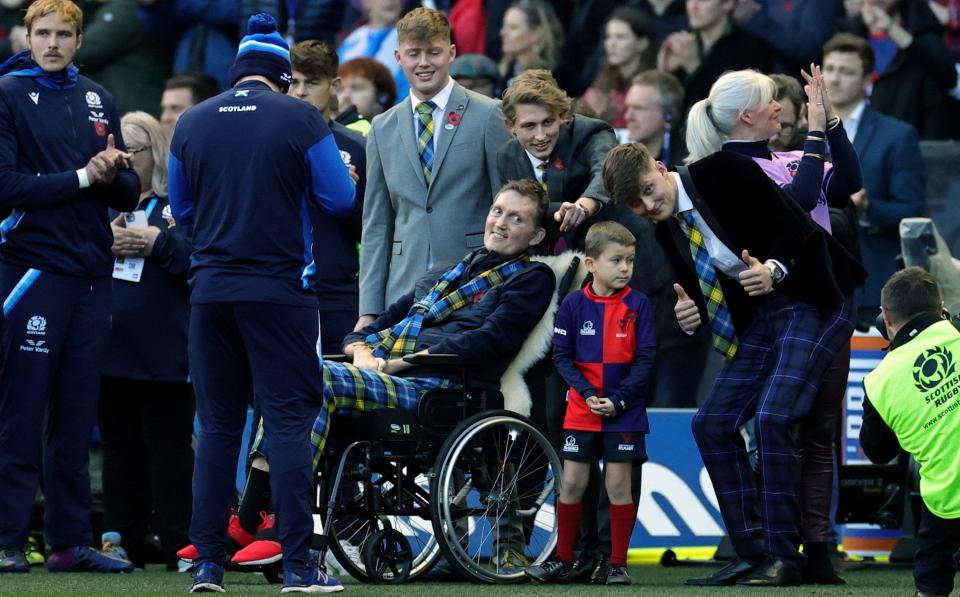Murrayfield’s favourite son Doddie Weir was a free spirit on and off the field

Scotland have arguably produced greater players, certainly ones who have tasted more success, but undoubtedly Doddie Weir will be remembered as Murrayfield’s favourite son.
So it was fitting that Murrayfield was able to salute Weir one last time before the 31-22 defeat by New Zealand earlier this month. His entrance onto the pitch, carrying the match ball, for the same fixture in 2017 was one of the most spine-tingling moments in the stadium’s near 100-year history.
At that point, Weir had already outlived the doctors’ original diagnosis, delivered just before Christmas in 2016, with motor neurone disease, which was given in mere months. Five years later, he was still smiling in the face of adversity, even as he was pushed in a wheelchair by his wife, Kathy, and sons Hamish, Angus and Ben.
He deserved every last drop of the acclaim and hopefully it registered with him quite how much he was loved, not just inside Scotland but by the whole rugby community because attention and adulation never sat comfortably with him.

If you listened to Doddie, which I did frequently as his ghostwriter for his Telegraph Sport columns, he was a bang average player, who enjoyed a drink and was just doing what anyone else would do in the same position in the fight against MND. He never understood the fuss about his feats.
His home was overflowing with trophies and awards for his fundraising but he seemed to attach more pride to letters from fellow MND sufferers saying how he had made a difference.
Any time you pointed out the millions he had raised through his sheer force of personality he would quickly change the subject. Hopefully his legacy as a player will not be subsumed by what came afterwards.
As Weir pointed out numerous times, his career was cruelly bookended between Scotland’s 1990 Grand Slam and the 1999 Five Nations title in which he played just one game before breaking his ankle. To his lasting regret, he never played in a Calcutta Cup victory.
He was also the victim of a heinous act of violence on the British & Irish Lions’ 1997 tour to South Africa when Marius Bosman karate-kicked Weir’s knee. The injury ruled him out of the series in which he was considered a certain starter, although his cameos on the Living with the Lions documentary cemented his growing legend.
Accused of breaking a team curfew by going out to a nightclub, Doddie’s deadpan response of “mistaken identity” is almost as seminal as Jeremy Guscott’s drop goal.
Weir’s career straddled the birth of professionalism and while he relished the opportunity to play full-time he never came to grips with the training or players being reliant on coaches for instructions. He was a free spirit on and off the field, which is why so many supporters related to him. Virtually any time he walked into a pub, an offer of a free pint quickly arrived and was invariably accepted.
After retiring in 2005 with a total of 61 Scotland caps. Weir returned to farming and proudly worked for Hutchinson sewage company – “Your No 2s are our No 1 priority”. Naturally he was an in-demand after-dinner speaker. There was not an audience he could not win over with his bonhomie and anecdotes, none of which, sadly, are suitable for a family audience.
His MND diagnosis diminished none of his mischief-making nor his love of a good time. The second time we met I was midway through ‘Dry January’. By the end of the night that concept, which he treated with the scorn it deserved, had been washed out in a shower of spirits.
Over the course of four years speaking to Doddie I never once heard a moment of self-pity. He would continuously also refer to how fortunate he was.
That he was surrounded by so many loving friends and family, that he had the means to support himself. That he was based on a farm rather than the 10th floor of a council block. The fact that he was so cosmically unlucky to have been diagnosed with MND in the first place was neither here nor there.
It was just the hand that he was dealt and he played it unbelievably well, making a mockery of that initial diagnosis, raising £8 million in the fight against the wicked disease and, perhaps most importantly, providing a message of hope to thousands of fellow sufferers.


